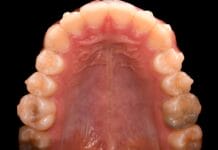Editor’s Note: This article was written by a hygienist who lives and is licensed in Canada. Some terms used may differ from what U.S. hygienists may use.
Dementia is a broad term describing a set of symptoms caused by disorders affecting the brain. Symptoms include short- and long-term memory loss, changes in mood or behavior, and difficulties with thinking, problem-solving, or language that are severe enough to impact the ability to perform everyday activities.1
It’s estimated that nearly 772,000 people in Canada are currently living with dementia. The number is projected to increase to one million people by 2030 and more than 1.7 million by 2050.2 Alzheimer’s disease is the most common type of dementia, accounting for 60% to 80% of all cases.3
Clients affected by dementia are addressed in the Knowledge Network, which includes fact sheets and advisories provided by the College of Dental Hygienists of Ontario (CDHO). The CDHO advisory outlines point-of-care procedures, treatment considerations, and resources to help dental hygienists understand this medical condition.4
Our role as a dental hygienist is to stay current and provide exceptional in-chair care for clients with mobility, dexterity, or cognitive limitations. While online resources are valuable, how can dental hygienists provide in-chair, empathetic, effective oral care for individuals with Alzheimer’s and other types of dementia? How can we transform our knowledge into practical support for at-home care and provide strategies for caregivers to assist in oral care?
A Personal Perspective
My father’s battle with Alzheimer’s spanned years, and I vividly recall moments in the early stages when he would ask the same question repeatedly, unaware he had asked it before. Simple tasks like setting the coffee maker for the next day became complex and required step-by-step instructions. During his gradual decline, the progression of the disease translated into his inability to communicate effectively and conduct his daily activities.
As an oral health care professional, I couldn’t ignore the association between the progression of Alzheimer’s and the decline in oral health. In the dental chair, I witnessed my father, once confident and capable of maintaining his oral health, struggle with oral health issues such as plaque buildup, calculus, and an increase in the severity of periodontal disease.
Research provides evidence for an association between specific oral bacteria, such as Porphyromonas gingivalis, and Alzheimer’s disease pathogenesis. P. gingivalis, a keystone pathogen in the development of chronic periodontal disease, releases a type of enzyme called gingipains. Though further studies are needed, research using animal models suggests that gingipains may be a driver in abnormal tau accumulation, which is associated with cognitive decline in Alzheimer’s disease. Abnormal tau accumulation disrupts the normal functioning of neurons, contributing to neuronal death.5
Discovering my father’s decline in oral health and learning about the association between chronic periodontal disease and Alzheimer’s reinforced the importance of educating our professional community on how to support those who are living with Alzheimer’s disease and other types of dementia.
Immersive Education
Empathy, an essential aspect of care, is heavily cultivated through experience rather than in formal education. Although hygienists graduate from accredited programs, treating populations with certain medical conditions requires continuous learning and exposure to the demographic.
To gain exposure, the Alzheimer Society of Canada offers in-person and online educational workshops and seminars for those living with dementia, their families, and caregivers.6 For health care providers, they provide professional development training, online courses, and other useful resources.7
The Alzheimer Society also conducts in-person virtual reality educational dementia immersive experiences (EDIE) through a 3-hour workshop to provide a simulation experience.8 I’ve participated in the in-person simulation through different regions of Ontario, and each experience was deeply enlightening. The tour highlights not only the physical challenges one would face if subject to the disease but also the emotional toll of dementia, fostering a greater understanding.
Alzheimer’s and dementia organizations provide resources on how dementia affects an individual’s life. As health care professionals, we shouldn’t shy away from connecting to resources that are available. By fostering interprofessional collaboration, attending training sessions, and staying current with research, we can develop empathy-driven, evidence-based solutions to maintain comfort within our care.
Limited Dexterity and Oral Hygiene at Home
Cognitive decline often impairs fine motor skills, making daily tasks like oral hygiene more challenging. I remember watching my father attempt his oral health routine, his once-precise techniques broken as his coordination diminished while the disease progressed. As dental professionals, it’s our responsibility to provide modified techniques and tailored recommendations for oral hygiene instruction.
- Toothbrush: It is best to choose a soft bristle toothbrush with a wider, longer, ergonomically designed handle. An addition of a non-slip grip can provide additional dexterity support. While electric toothbrushes are often recommended for individuals with limited dexterity, they may not be suitable for those with advanced Alzheimer’s disease. The vibration and noise can act as sensory triggers, potentially causing confusion and upset.4,9
- Interdental aids: We want to embrace innovative dental aids that address dexterity issues, as those with cognitive decline can forget proper positioning. Interdental brushes and floss holders with extended handles can simplify interdental cleaning, as the traditional technique of using string floss requires a combination of dexterity and cognitive ability. Interdental aids that include a finger and thumb impression make oral care more intuitive.9,10
As cognitive ability decreases, we can also recommend visual cues, such as Post-it notes or picture cards mounted to mirrors and doors at eye level. This can act as a reminder and reinforce routine. Visual cues work best when made in bright and high-contrast colours.11 Yellow and black are commonly used, as the color combination lasts the longest in human eyes.12
Empowering Caregivers
Caregiver distress affects 45% of those supporting older adults with dementia.13 Caregivers often struggle to balance their roles while managing resistance to care. These challenges are brought to light, especially when attempting to maintain an oral health routine at home. Through collaboration, we can help identify strategies to support the caregiver.14
Guidance can be provided on at-home caregiver-assisted oral care, how to recognize oral health issues, and management of resistance to care.14 As resistance is a common occurrence as the disease progresses, strategies to aid in assistance can include:9
- Short, simple instructions: Simplify instructions into small, manageable steps and give one direction at a time. Instead of saying, “Brush your teeth,” guide the person through the process step-by-step, starting with “hold your toothbrush.”
- Watch me method: Show them how to brush by holding a toothbrush and demonstrating or gently guiding their hand by placing your hand over theirs.
- Tell-show-do method: Let the person know that you’ll be helping them brush their teeth. Explain each step before you do it. Demonstrate what you’re going to do for each step, then follow through exactly as you described.
While using these recommended methods, if the caregiver is still unable to provide or assist with oral care, advice on alternative oral hygiene care can be provided, such as using gum and teeth wipes, oral care swabs, or wiping away plaque with a Q-tip or gauze.9 We can also recommend performing care in an alternative environment other than in the bathroom. Watching their favorite TV show or listening to music while sitting in a comfortable chair in a living space may provide enough distraction to complete oral care.
In Closing
Personal experiences, such as my father’s battle with Alzheimer’s, underscore the association between oral health and this degenerative disease. It also highlights the critical need for preventive strategies, personalized care, and practical resources to support both clients and caregivers from the moment of diagnosis.
In an aging society, the responsibilities of our profession extend far beyond the treatment chair. Alzheimer’s and other types of dementia will become more prevalent, and our role will be crucial in supporting our clients and their caregivers, who shoulder much of the responsibility for their daily care. By fostering empathy, expanding our knowledge, and embracing collaboration, we can ensure there is care beyond the dental chair.
Before you leave, check out the Today’s RDH self-study CE courses. All courses are peer-reviewed and non-sponsored to focus solely on high-quality education. Click here now.
Listen to the Today’s RDH Dental Hygiene Podcast Below:
References
- What Is Dementia? (n.d.). Alzheimer Society of Canada. https://alzheimer.ca/en/about-dementia/what-dementia
- Dementia Numbers in Canada. (2024, July 24). Alzheimer Society of Canada. https://alzheimer.ca/en/about-dementia/what-dementia/dementia-numbers-canada
- The Difference Between Alzheimer’s Disease and Other Dementias. (n.d.). Alzheimer Society of Canada. https://alzheimer.ca/en/about-dementia/what-alzheimers-disease/difference-between-alzheimers-disease-other-dementias
- CDHO: Dementia Advisory. (2024, June 26). College of Dental Hygienists of Ontario. https://cdho.org/advisories/dementia/
- Dominy, S.S., Lynch, C., Ermini, F., et al. Porphyromonas gingivalis in Alzheimer’s Disease Brains: Evidence for Disease Causation and Treatment With Small-Molecule Inhibitors. Science Advances. 2019; 5(1): eaau3333. https://pmc.ncbi.nlm.nih.gov/articles/PMC6357742/
- Programs and Services. (n.d.). Alzheimer Society of Canada. https://alzheimer.ca/pklnh/en/help-support/programs-services
- Professional Development. (2024, May 6). Alzheimer Society of Canada. https://alzheimer.ca/en/help-support/im-healthcare-provider/professional-development
- Virtual Reality – Educational Dementia Immersive Experience (EDIE). (n.d.). Alzheimer Society of Canada. https://alzheimer.ca/pklnh/en/EDIE
- Dental Care. (n.d.). Alzheimer’s Association. https://www.alz.org/help-support/caregiving/daily-care/dental-care
- Dick, E., Rachael, F. Modifying Oral Hygiene Techniques to Improve the Oral Health of Alzheimer’s/Dementia Patients With Limited Dexterity. Journal of Oral Hygiene and Health. 2023; 11(3): 364. https://www.omicsonline.org/open-access/modifying-oral-hygiene-techniques-to-improve-the-oral-health-of-alzheimersdementia-patients-with-limited-dexterity-123517.html
- Wiener, J.M., Pazzaglia, F. Ageing- and Dementia-Friendly Design: Theory and Evidence From Cognitive Psychology, Neuropsychology and Environmental Psychology Can Contribute to Design Guidelines That Minimise Spatial Disorientation. Cognitive Processing. 2021; 22(4): 715-730. https://pmc.ncbi.nlm.nih.gov/articles/PMC8545728/
- Making a Dementia-Inclusive Resource Centre. (n.d.). Alzheimer Society of Canada. https://alzheimer.ca/nb/en/about-us/our-resource-centres/making-dementia-inclusive-resource-centre
- Unpaid Caregiver Challenges and Supports. (n.d.). Canadian Institute for Health Information. https://www.cihi.ca/en/dementia-in-canada/unpaid-caregiver-challenges-and-supports
- Oral Health Tips for Caregivers Supporting Older Adults Living With Dementia at Home. (2020, January 27). Public Health Agency of Canada. https://www.canada.ca/en/public-health/services/publications/healthy-living/oral-health-tips-caregivers-supporting-older-adults-with-dementia.html











